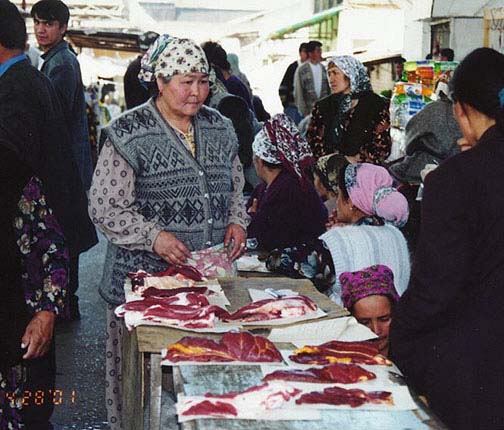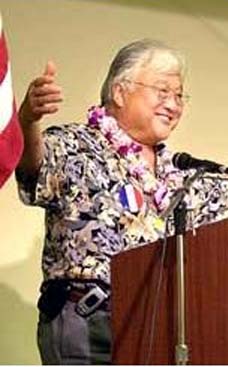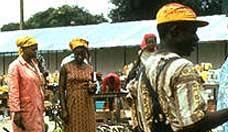
During a military crackdown in Uzbekistan this spring, thousands of Uzbeks fled to Kyrgyzstan. For safety reasons, the Peace Corps evacuated Elizabeth and two other volunteers to the capital city of Bishkek, which is further from the border.
Elizabeth Cullen is teaching English thousands of miles away in Kyrgyzstan
Feeling at home in Kyrgyzstan
By Faith Tomei/ ftomei@cnc.com
Thursday, July 21, 2005
Ipswich native Elizabeth Cullen is teaching English thousands of miles away in Kyrgyzstan, one of 15 republics that made up the Soviet Union until 1991. A Peace Corps volunteer since September 2004, she has spent most of her time in a town called Kara-Su near the border of Uzbekistan.
During a military crackdown in Uzbekistan this spring, thousands of Uzbeks fled to Kyrgyzstan. For safety reasons, the Peace Corps evacuated Elizabeth and two other volunteers to the capital city of Bishkek, which is further from the border.
When the political situation settles down, she hopes to return to her host family in Kara-Su and to resume teaching at a local boarding school. She also runs an English Club for university students, helping them write essays and prepare for exams to go to the US and other English-speaking countries to study.
The daughter of Walter and Mary Cullen, Cullen graduated from Ipswich High in 2000 and from UMass-Amherst, last spring.
Mary Cullen, a math teacher, last week put together a PowerPoint presentation on her daughter's experiences in Kyrgyzstan as her project in the technology workshop for teachers at Ipswich Middle School.
Elizabeth responded to questions from theChronicle by e-mail from an Internet café in Bishkek June 16. Here she describes in detail her experiences living in the predominantly Muslim country of Kyrgystan.
Are you back with your original host family in Kara-Su? What are their names? Any special customs?
I was temporarily evacuated on May 15 from Kara-Su. Kara-Su borders Uzbekistan in several different places and is made up of mostly Uzbeks. In one area there is a river that connects the two countries.
After the incident in Andijan, a bridge was built across this river and hundreds of refugees came into Kara-Su. Because of this, the Peace Corps didn't want any volunteers there. I still stay in touch with my host family by phone and I have been back a few times to visit for the day. My host mom's name is Gulnara, I call her Apa which means mother.
My host father is Tashtamir, I call him Ata, which means father. I have two host brothers, Becksultan, 18, and Beckmurat, 16, and a host sister, Ijan, 23. Ijan just had a baby. The first 40 days she stayed with us and then moved back in with her husband. The babies always spend the first month with their mother so the mother can rest before getting back to her house where she must work.
What is unique about the lifestyle there? Is it a poor country?
There is a special Muslim tradition where you say "omen." You put your hands together palms up, like open to God, and then move them across your face.
Click to learn more...
We do this when we finish eating, when we pass a cemetery, when we get in a car and take off, and at any religious celebration. Vodka is also a huge part of the lifestyle here. Many people think that vodka cures all. Vodka is at all social occasions and it can be very difficult to refuse. Also, parties do not end until every person has given a toast.
Guesting is also very important. People here know that I am a guest to the country, and I am treated with utmost respect. I am invited to guest at people's houses all of the time. When you go to someone's house they will have you sit the furthest from the door, to let you know that you are welcome. You will not be expected to serve yourself at all, and people put in so much time in preparing for guests. Often you are expected to stay at their house. You will sleep on tushiks, national carpets made and given to the bride on her wedding day. Every house will have a room filled with tushiks lined up on the wall.
The country is very poor. People are either poor or rich. There is no middle class.
What is the dominant religion? Are there vestiges of Communism?
Most people here are Muslims but there are some Catholics. So much of the Soviet Union still exists here. There are huge statues of Lenin everywhere. Also in schools students were always taught to memorize whatever their teacher told them. Students were never expected to think critically or formulate their own ideas. This can be a challenge in the classroom, and many of us work on projects where the kids have to think on their own.
What is the government like? Is it in better shape than Uzbekistan?
The government is similar to Uzbekistan. The former president, Askar Akayev, was president here since before the collapse of the Soviet Union. The government was so corrupt that in March the citizens forced him out of office. The new presidential elections (were to be held) on July 10.
Although we don't think the political situation here is as bad as Uzbekistan, we still have many problems. A few weeks ago a government official in Bishkek was killed, and on Monday there were some demonstrations and shootings in Osh. These are all related to the elections, so we are not quite sure what will happen.
Part of the government's problems come from the difference between the North and the South parts of Kyrgyzstan. The South is very conservative, while the North is really liberal. It was mostly people in the South who overthrew the president; if someone from the North wins the upcoming election, a lot could happen.
What is the food like? Have you adjusted to the diet?
The meat that is mostly eaten is mutton. Sheep are sacrificed on many occasions; if it is a very special occasion, a horse will be slaughtered. I have eaten sheep tongue, brain, intestines, esophagus. I have also eaten horse meat, as well as horse intestines.
I like to eat tongue, but I do not eat intestines. People here like to eat animal fat more than the meat. I let my host family know early on that I don't eat animal fat and they always save the meat pieces for me.
The two most famous Kyrgyz dishes are "besh barmak" and "plov." Besh barmak means five fingers, because you eat it with your hands. It is a pasta dish with meat, fat, garlic and onions. They eat this mostly in the North.
In the South we eat plov. This is rice cooked with mutton, carrots, onions and garlic. I like this dish a lot. With my host family, I eat this three or four times a week. In the summer it's great. We put all sorts of fresh vegetables on top. We also eat "manti," which is like a really big ravioli stuffed with mutton and onions. Sometimes it will be prepared with potatoes.
"Samsa" is dough baked, then stuffed with mutton and onions. One of my favorite dishes is "lagman." This is homemade noodles cooked with meat and all sorts of vegetables. We also eat a lot of Russian dishes.
There are always lots of fresh fruits and vegetables, and they are so cheap.
Are other Peace Corps volunteers nearby?
I was in Kara-Su with two other volunteers who are serving as a married couple. I am also 30 minutes away from Osh City where there are about 15 volunteers. I like my situation because I don't like spending too much time with other Americans. That's not why I came here, but sometimes it is very important to see another American, speak English and share stories. This summer I am living in Osh, but spending most of my time traveling around the country and working at camps.
Click to learn more...
Have you made friends with the people in the village?
I have made a lot of local friends. At my school in Kara-Su there are many young teachers, and we spend time together. Most of my friends are about 18 years old, because girls my age are all married with a few children. Some of my friends speak English, and some don't know a word of English.
Now that I have been evacuated from Kara-Su, I have friends coming in to Osh to visit. It is important to have friends. They can help you with anything you need, and the community is more welcoming towards you when you know that you are welcomed by others.
Your mother said you teach English and have started clubs for high school and university students. Are students receptive to your efforts?
Yeah they are; I love my clubs. I have a club in Osh at the Soros Foundation. It is a conversation club, and about 30 university students attend. I am usually there for three or four hours. The first two hours we talk about a certain issue; then at the end I help students with homework and college applications, or they bring in words they have heard or idioms they don't understand.
One of my greatest moments happened just yesterday. Last week in class we discussed male and female roles. The men were all saying that women are not equal to them. They must stay at home and take care of the house and the children because they are not equal and must obey their husband.
All of the students were debating and at the end asked me my opinion. The boys were all telling me I was wrong. Yesterday two boys took my aside and told me that they had been discussing what I had said to them and decided that I was right. It was a great feeling to know the kids go home and talk about what I tell them.
In Kara-Su I have clubs every day of the week with kids of all ages. The school is a boarding school, so these students only go home for one day a week. The school is first to 11th grade. A lot of them look to me as a friend and love to ask my advice.
The kids and I write back and forth. I bought all of my students journals here. It means so much to them to know that we have a sort of special relationship. In many ways these kids need to feel good about themselves. I want them to be confident, and we do lots of activities with that. We play basketball and Frisbee almost every night in teams. Frisbee is new to them. My parents in Ipswich are sending baseball equipment and a football.
What do you like most about life there?
I really don't know where to begin. The landscape is beautiful. I live on a river; I can see the mountains from wherever I am in the country. There are fields everywhere.
The people are amazing. I am treated like a queen. I am called Lizahan in Kara-Su. The "han" is a special ending that means queen. When someone realizes that I am an American living here, working with community and speaking Kyrgyz, everyone wants me to come to their house.
People are helpful and the kids are so fun to work with. The way of life is so laid back, but in some ways can get to me. I love being here knowing that I am doing something good. I take part in as many activities and clubs as I can. The more I help out, the better I feel. The more friends I make, the more I feel like I am really making a difference. I love learning about another culture, and figuring out what I can live with and what I can do without, and what is really important to me.
What do you like least about life there?
Sometimes it's that I can only bathe one or two times a week. Other times it's dealing with a pit toilet or an outhouse. During the winter it is so cold and there is no heat and, for many days at a time, no electricity. Sometimes it is a language barrier. Right now it is so hot I wish that I was on Crane Beach!
What made you decide to go into the Peace Corps? Was Kyrgyzstan your first choice? If not, what was?
It's something that I have always dreamed of. In the fifth grade, someone came and gave us a presentation about Peace Corps Nicaragua. I remember thinking it sounded so great.
When I was finishing up my senior year at UMass I wasn't quite ready to get a job. I didn't know what I wanted to do, and didn't want to get stuck working for some job that I was unhappy with. I figured I am still so young and have the rest of my life to work. I wanted to travel to other countries, learn a new language, meet new people, have an adventure, and do so much learning.
I have learned so much in the past nine months that I have been here. For me, the best part is knowing that each day I am doing something good and I am helping out other people.
Kyrgyzstan was not my first choice, but I wanted to leave the summer after graduation. The only opportunities were in Central Asia. I picked this general area. First my assignment was Uzbekistan, but I was not able to go because the Uzbek government was not giving any new visas. My first choice would have been Central America or the Caribbean, but now that I am here I love it and think this was the right place for me to be. It's great living in a Muslim country with recent events and to be here while a revolution is happening.
Is the experience what you expected it to be? If different, how so?
I thought that I was going to have to wear long skirts and cover myself fully. I haven't once worn a long skirt since I have been here.
I also thought I wasn't going to fit in with any of the other American volunteers. I didn't know what to expect from them. The volunteers are great. They are some of the best friends I have ever had before. Our group has 65 new volunteers; our average age is 24. I am leaving today with two of my best friends. We are traveling across country on horses and, throughout our trip, visiting other volunteers and working at girls' camps.
I guess I also expected to have a more difficult time here. I look forward to the rest of my service.











